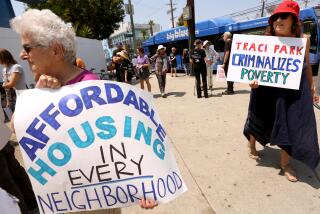They Are Free to Die on Our Streets
- Share via
The recent clash between the American Civil Liberties Union and the Los Angeles Police Department over the rights of our city’s homeless to live on the streets of skid row exemplifies the limited options facing tens of thousands of our most desperate citizens.
Under the LAPD’s approach, homelessness is criminalized. Homeless people are ticketed for minor violations such as littering, jaywalking, vagrancy, disturbing the peace and loitering. The police harass them and ultimately incarcerate them for petty offenses and minor drug possession charges. Jail becomes their temporary home.
Los Angeles County Sheriff Lee Baca repeatedly has emphasized that our jails are not designed or equipped to rehabilitate our city’s homeless. Jail confinement is especially dire for those with severe mental health and substance abuse problems. The limited treatment available has no long-term corrective effect. Homeless arrestees simply serve their time and are released back to the streets to repeat a downward spiral of destitution.
The law enforcement approach is not only ineffective, it is also costly. The daily cost of a jail bed ranges from $60 to $140, while the average daily cost of a shelter bed with supportive services ranges from $25 to $50. Daily jail costs for a homeless individual with acute psychiatric needs range from $300 to $400, while a bed at a residential treatment center ranges from $90 to $110. And it is always more cost-effective to divert homeless people from the criminal justice system when they commit petty, nonviolent offenses.
But if jail is not the answer, neither is allowing homeless people to languish on our streets. In our city, as many as 30,000 homeless individuals suffer from treatable mental illness and substance abuse problems. The ACLU’s fight to preserve the right of homeless citizens to freely reside in public places inadvertently transforms them into untouchables. They are free to deteriorate on our streets until they pose an absolute threat of danger to themselves or others. By then it is too late.
Street people who suffer from mental health and substance abuse problems have difficulty functioning in our complex city environment. We have all seen people with matted hair, rotting limbs and gaping lesions wandering into busy intersections. Every day, these situations lead to emergency room visits, degradation and, ultimately, premature death. This freedom to die on the streets is inhumane.
We must develop a real solution to homelessness, an effective alternative to jail or the street. Neither the law enforcement nor the civil rights approaches offer effective or humane solutions alone. Law enforcement and the civil rights community must work together, along with others, to eradicate homelessness in a responsible way.
The LAPD needs to stop harassing and jailing and start working with mental health, housing and social service agencies to help high-functioning homeless people locate safe, decent places to live. There are many effective homeless service agencies in Los Angeles; police officers should write admission tickets to these agencies, not tickets to jail.
The ACLU could work with local policymakers, law enforcement officials and mental health experts to design treatment programs. These programs would offer treatment on demand and allow for involuntary, yet compassionate, treatment of homeless individuals with severe mental health and substance abuse problems. For every $1 of treatment, we save $8 in health, safety and all other societal costs.
The recent passage of Proposition 36, which allows for the diversion of people convicted of minor drug offenses to treatment programs, and the creation of the Homeless Court for minor offenses when individuals successfully complete a self-sufficiency program, offer law enforcement and the civil rights community a starting point for developing a new, humane and effective model for homeless interventions.
More to Read
Sign up for Essential California
The most important California stories and recommendations in your inbox every morning.
You may occasionally receive promotional content from the Los Angeles Times.










